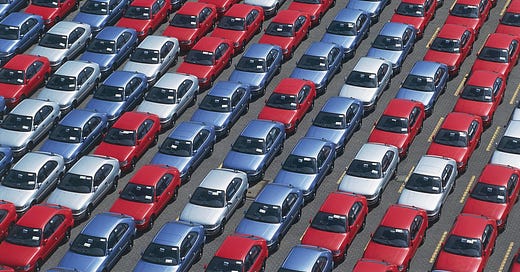
Germany’s car crash could push the country into recession
Berlin’s economic mainspring is effectively broken.
It’s not very British, nor very charitable, but there is nothing like the misfortunes of others for cheering us up. The Germans have a word for it, schadenfreude, and if you think we’ve got problems (we have) then our friends there are in an even worse state. There is no functioning government, no prospect of any rational energy policy (hydrogen, anybody?), and the country’s economic mainspring is effectively broken.
That latter is, of course, the motor industry. Its world-beating cars are powered by petrol, and the politicians in Brussels are almost as hell-bent on their destruction as ours in London. The difference is that the UK’s motor industry has already been reduced to Jaguar Land Rover and Nissan (plus a few specialists) and between them they have extracted billion-pound subsidies to keep them aboard. The famous Luton van is not going to come from Luton any more, as its parent cuts back to Merseyside.
A penetrating analysis from Capital Economics this week, entitled “The slow agony of Germany’s auto industry”, spells out the slow-motion car crash that Capital reckons will push the country into recession. Two generations of engineering excellence are being overtaken by battery technology. Increasingly, this looks like a battle that Europe (including the UK) has already lost.
The process of making high-tech batteries bears little resemblance to conventional manufacturing. It’s not even a question of cost. Northvolt, a plant in Sweden’s far north that always sounded like something out of a Philip Pullman novel, has collapsed despite €15 billion of support. The UK version was such a poor investment that it failed before construction even started.
The Chinese have cracked the tricky technology, but, as usual, they have overdone it. Their installed battery-making capacity is more than twice current world demand, and they plan to double it again, dumping the output anywhere which will take it, tariffs or no tariffs. No sensible government elsewhere is going to fund a domestic plant which would effectively be a loss-making, anti-growth project.
The long-term prospect is of solid-state batteries powerful enough to overcome range anxiety, which might help us to love electric cars after all, but this helps explain why we won’t buy them today. In the UK, heavily-subsidised company buyers dominate, and second-hand values are pitiful. The companies have been reduced to blanket advertising and big discounts to tempt private buyers on board, alongside desperate pleas for yet more state assistance.
Unfortunately, rational thought from various UK governments on this subject is conspicuous by its absence, sacrificed on the altar of political expediency and crowdpleasing.
Rather than slow down the wild ride to Net Zero, Labour has pressed the pedal to the metal, confirming the deadline for new petrol cars at 2030 - tomorrow, in carmaking terms. It is grim to see the incredible shrinking UK motor industry that is the result, but at least it’s not important enough to be catastrophic. It is for the Germans.






